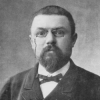Henri Poincare

Henri Poincare
Jules Henri Poincaréwas a French mathematician, theoretical physicist, engineer, and a philosopher of science. He is often described as a polymath, and in mathematics as The Last Universalist by Eric Temple Bell, since he excelled in all fields of the discipline as it existed during his lifetime...
NationalityFrench
ProfessionMathematician
Date of Birth29 April 1854
CountryFrance
zero mean numbers
Zero is the number of objects that satisfy a condition that is never satisfied. But as never means "in no case", I do not see that any progress has been made.
errors produce latter
A small error in the former will produce an enormous error in the latter.
skeletons understanding mind
How is it that there are so many minds that are incapable of understanding mathematics? ... the skeleton of our understanding, ... and actually they are the majority. ... We have here a problem that is not easy of solution, but yet must engage the attention of all who wish to devote themselves to education.
facts doe language
All the scientist creates in a fact is the language in which he enunciates it. If he predicts a fact, he will employ this language, and for all those who can speak and understand it, his prediction is free from ambiguity. Moreover, this prediction once made, it evidently does not depend upon him whether it is fulfilled or not.
wish different looks
If one looks at the different problems of the integral calculus which arise naturally when one wishes to go deep into the different parts of physics, it is impossible not to be struck by the analogies existing.
discovery intuition important
Intuition is more important to discovery than logic.
eye past thinking
The advance of science is not comparable to the changes of a city, where old edifices are pitilessly torn down to give place to new, but to the continuous evolution of zoologic types which develop ceaselessly and end by becoming unrecognisable to the common sight, but where an expert eye finds always traces of the prior work of the centuries past. One must not think then that the old-fashioned theories have been sterile and vain.
stars distance moving
Consider now the Milky Way. Here also we see an innumerable dust, only the grains of this dust are no longer atoms but stars; these grains also move with great velocities, they act at a distance one upon another, but this action is so slight at great distances that their trajectories are rectilineal; nevertheless, from time to time, two of them may come near enough together to be deviated from their course, like a comet that passed too close to Jupiter. In a word, in the eyes of a giant, to whom our Suns were what our atoms are to us, the Milky Way would only look like a bubble of gas.
discovery important guessing
Guessing before proving! Need I remind you that it is so that all important discoveries have been made?
data simplicity
Analyse data just so far as to obtain simplicity and no further.
mind one-day doe
Einstein does not remain attached to the classical principles, and when presented with a problem in physics he quickly envisages all of its possibilities. This leads immediately in his mind to the prediction of new phenomena which may one day be verified by experiment.
ideas long mind
Often when works at a hard question, nothing good is accomplished at the first attack. Then one takes a rest, long or short, and sits down anew to the work. During the first half-hour, as before, nothing is found, and then all of a sudden the decisive idea presents itself to the mind.
leadership law long
The mathematical facts worthy of being studied are those which, by their analogy with other facts, are capable of leading us to the knowledge of a physical law. They reveal the kinship between other facts, long known, but wrongly believed to be strangers to one another.
science night thinking
Thought is only a flash between two long nights, but this flash is everything.